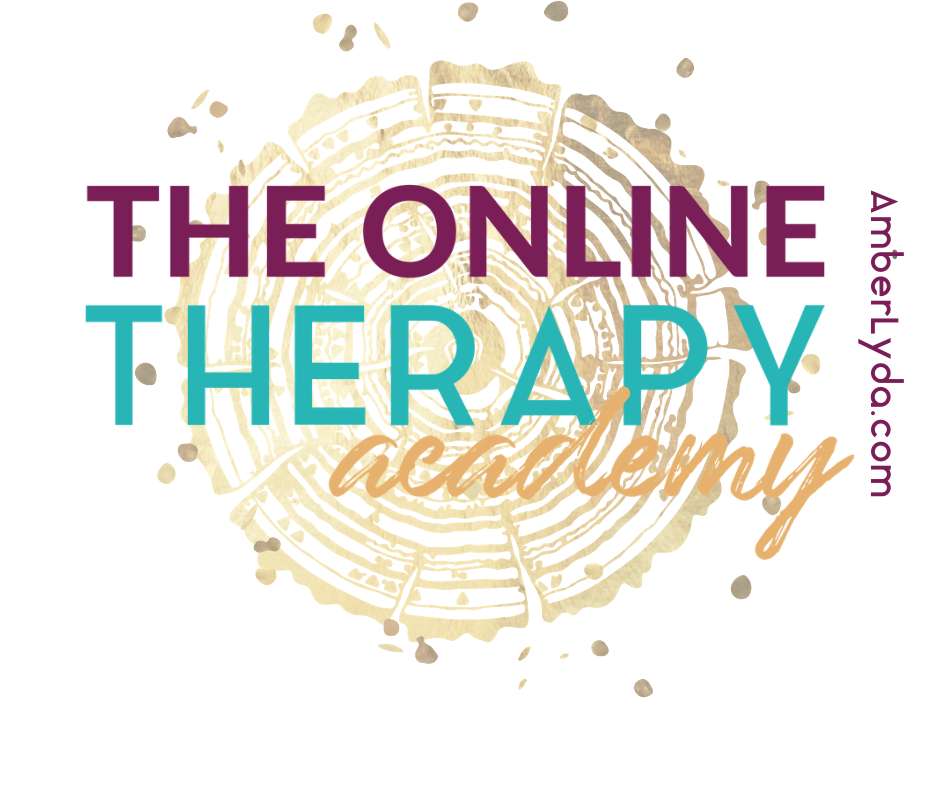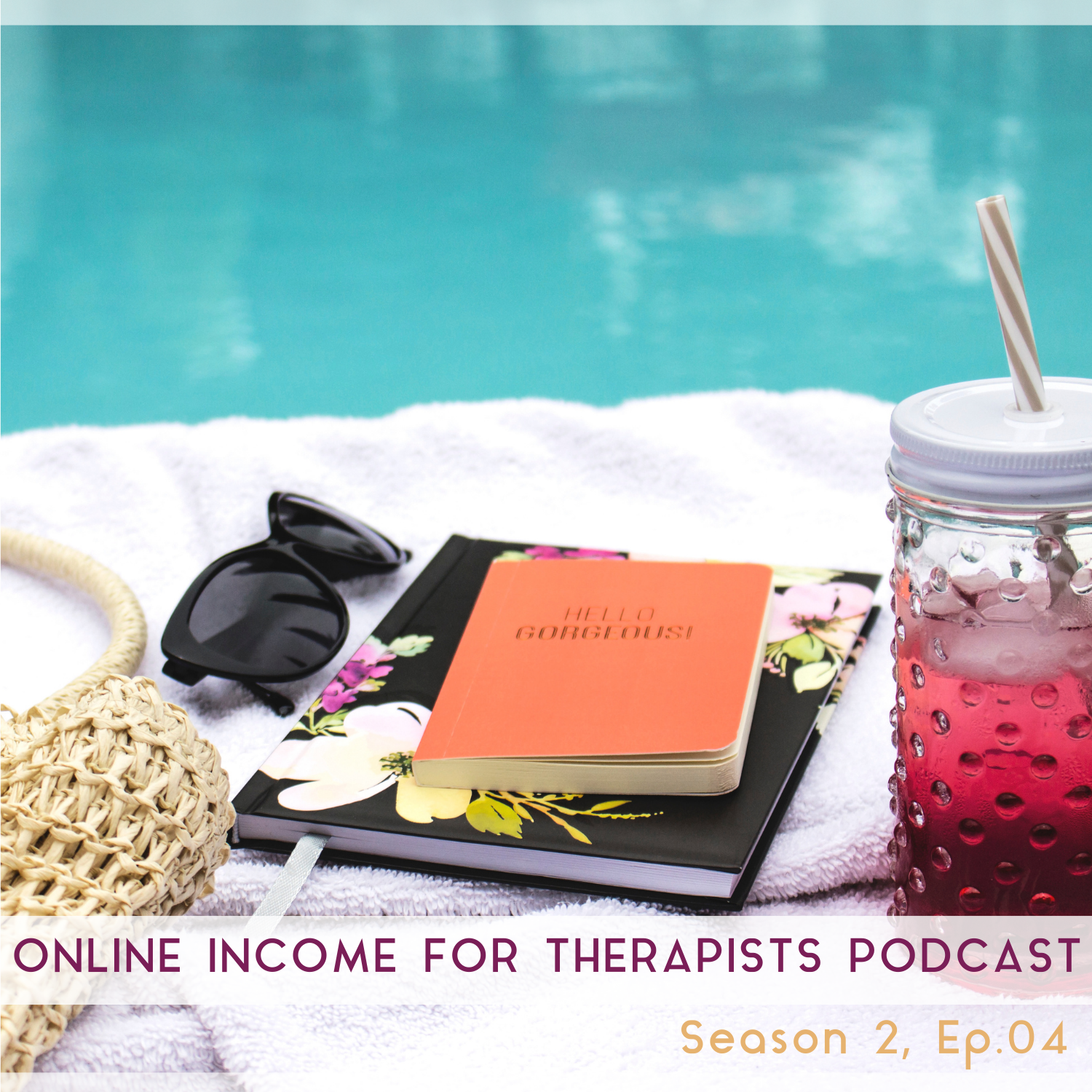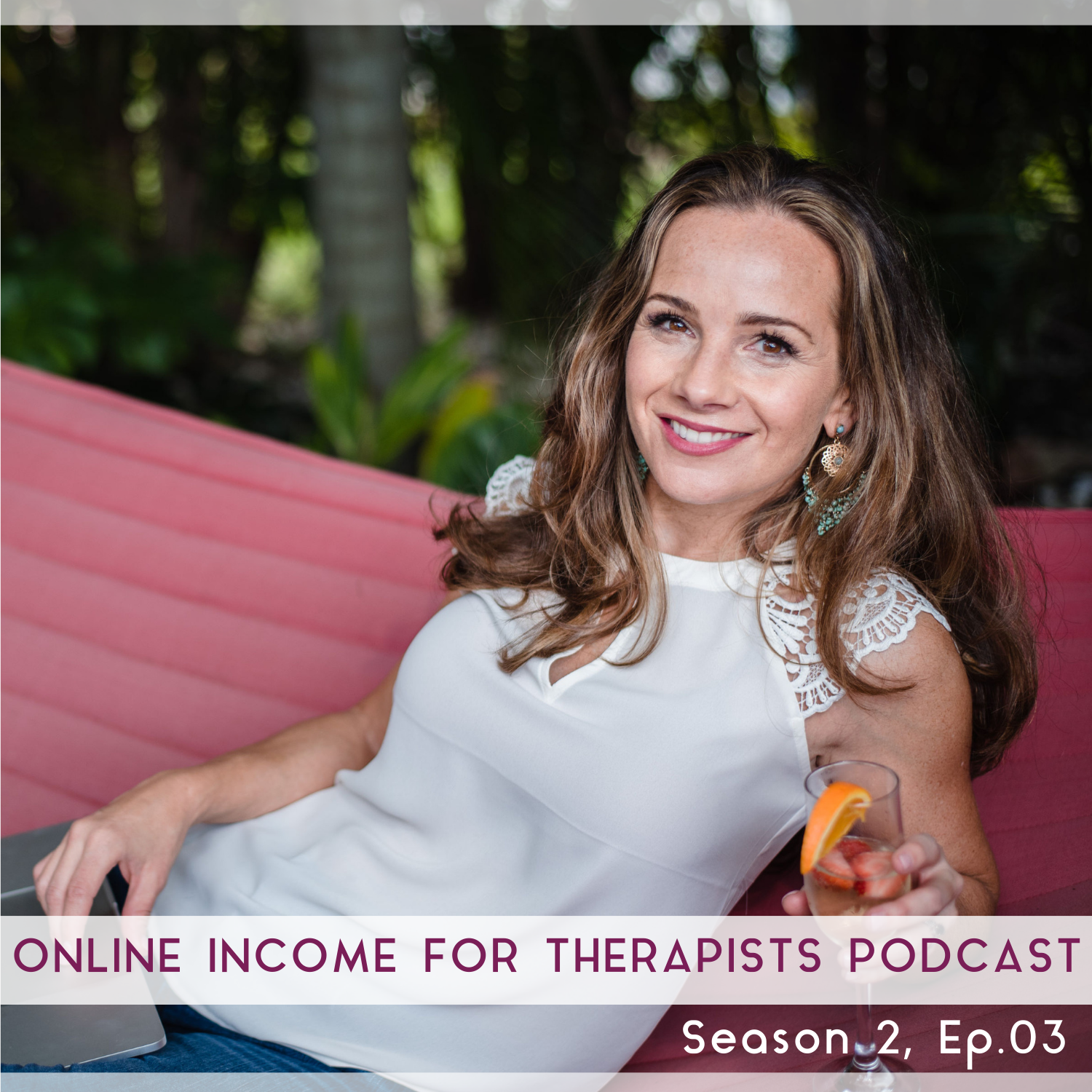Season 2, Episode 3: Setting Online Therapy Session Rates (And Coping with Your Inner Critic)
Subscribe and never miss an episode!
iTunes | Spotify | Stitcher | Google Podcasts Overcast | Castbox | Pandora | Amazon Music Podcast Addict | Podchaser | Pocket Casts Deezer | Listen Notes | PlayerFM | Podcast Index Castro | PodFriend
Welcome to the online income for therapists podcast!
what this episode is all about
So, you want to increase your rates, but you have an internal critic who's just yammering yammering yammering in your ear, making it hard for you to take the steps that you need to to increase your rates to start getting some self-paying clients or to fill with self-paying clients and today we're going to work through some of those internal critical thoughts that you might be having so that you can free yourself up to be able to live the life that you want.
Want to Follow Along…
01:25
Today, I'm going to give you a quick and easy way to work around that internal critic that will not stop yapping at you. And, so I know that most coaches teach you that the way for you to start billing higher, you know to start having higher paying, self-pay rates, is to really tap into your worth and to make sure that you are owning your worth via your rates. Well, you guys, I have a lot of work to do in that area, apparently, because that strategy never worked for me. So what I did instead is I did math and experimentation and I'm going to teach you the math and the experiments that are going to let you bypass the work on your self-worth that many people will say is required before you can increase your rates and I'm going to tell you that instead, if you can do the math and the experimentation, and you see, "oh my gosh, my clients are paying my full fee rate," all of a sudden, you're gonna start feeling more worthy of that rate and so it's a backdoor way to start working through your worth, which is not the point here. The point is that we don't have to wait until you feel worthy to have rates that support the life that you need to live. So, paying off your loans, being able to fund your retirement, I don't know, paying down your mortgage, being able to go on vacation, having time to pick your kids up from school, all the things that we would like to have in our lives.
02:49
I want to read to you two quotes. So. I've been reading Atlas of the Heart by Brene Brown recently, and one of the quotes in there is, "daring to set boundaries is about having the courage to love ourselves even when we risk disappointing others." There will be clients that you disappoint, because you weren't a good fit in some kind of way. Many of you've already had this experience. And one of the ways that you might not be a good fit is your rate, your rate might not fit for their financial situation. And so being able to hold your boundary even when it's going to result in disappointing someone else, including other therapists who might be judging you (whole video about that for you if you want to check it out), that is a sign of health. Related insight here also in the same book by by a different author. So, Prentis Hemphill, who I read this quote and again, in Atlas of the Heart was, "boundaries are the distance at which I can love you and me simultaneously." So your love for the other person doesn't cost you the love for yourself.
03:58
And I want to share with you a story about my own therapist and how we landed on our rate together. So, I didn't know my therapist rate when I was just calling as a potential client, was not on the website. And I had heard about this person from multiple friends. So I had been asking like, "I need a therapist, I don't know who to go to." You know, it's hard to find a therapist as a therapist. This person's name had come up repeatedly, so he was already what I would call a warm lead. So, if you're in my course you hear me talking about marketing a lot and talking about cold, warm and hot leads. I was already warmed up to this dude, right? So, when we call, when I call and we do the free consultation, it was evident to me like "oh boy, he and I are really good match." He did a great free consultation and part of that consultation eventually involved telling me his rates. He did not tell me his rates in the beginning. And when he told me his rate, my initial reaction was like, "Ooh, I definitely cannot afford that rate. No, it can't, I can't pay that much." And he said to me, "Looks like you had sticker shock and I think maybe what would be helpful, because it feels like we're really good fit in every other kind of way, is to take some time, look at your finances and check it out and see was that just a sticker shock reaction or truly is it not affordable? In which case, you know, I'll help you find somebody else. And I'll also look at my family finances and see if it is realistic for me and my family, for me to lower that rate. And let's see, you know, where we land, see, see what happens." And he scheduled a follow up with me and I met him for that follow up and I did look at my finances and I saw that I could, I could ish afford that rate, I was going to have to give up a few things to afford it comfortably. And so ,that's a lie, I couldn't afford the rate, let me go back, I couldn't afford the rate, but I could afford close to the rate, not comfortably, I was going to have to give some things up. And so I did, I chose to give up several things in my life that had been kind of normal at that point, including my fancy cable package, so that I could come closer to his rate. And when we met, I said I can't get to that rate, but I can get to here and it was you know, some amount off, and he said, "That's perfect, because when I did the math, I could get to that same place." So we coordinated and it was such a beautiful example of how he said to me not that I'll just slide the scale to wherever you need, right? He said, I'm going to go check with my family, my finances for my family, so he was modeling for me, and come back to you and see if there's some wiggle room and you go do the same. Just a beautiful example. "Boundaries are the distance at which I can love you and me simultaneously," Prentis Hemphill. Hope I'm saying that right.
07:01
So, let's talk about the math. So, let's figure out your math so that you know where you need to be. I think about this, and there's a formula in my course that I go through in detail, but just kind of a quick overview. So if you think about what you need to be able to afford to live your life right now, come up with that number and I always work in gross, because it's easier. But if you want to work with adding in taxes, I go heavy at 30% because I don't want to be wrong and owe more money. So totally up to you. But let's say that you go with gross. And let's say that you need to make $100,000 gross to be able to afford your life. So later, if you want to get fancy, we'll talk about good, better and best goals, let me know if that'd be interesting to you, but we're just going with basic here. So what you need, and let's say you need $100,000 gross. So that's the total amount that you make, we're not taking out taxes, we're not taking out expenses,this is the total amount that you need to cover all the things, right? The total amount that you're making. So $100,000. Then I'm going to think, alright, so how many weeks do I want to work and I want to work 48 weeks, I don't want to work 52. So I'm going to divide that $100,000 by 48 weeks, that's how much money I need to make per week, then I'm going to divide that by the number of hours, I want WANT, not the number of hours you think you need to, but the number of hours you want to work. I wanted to work 12 to 15 clinically, because I wanted to build a side hustle on the side and I knew I needed time to do that. So then you're going to go ahead and do that division and that is the fee per hour that you need to charge to live the life you want to fund the life you want to work the hours you want. So, I'd love to hear any qualifying questions that you have about that, that's obviously like a very unsophisticated kind of math, but that is exactly the math that I did to land at $200 an hour 12 to 15 clients per week. And then the rest of the time was going to be, being able to work on my side hustle and then overtime, my ultimate goal was to have most of my income coming from the side hustle so that all of my therapy could be icing on the cake, which is where it is right now. So it can be done. Alright, so now you've done the math and you've gotten your number. Let's say your numbers, my number. Let's say it's $200. So great. We have that math.
09:25
Now we have to do the experiment. So the experiment is not, "Am I worth that much?" But does the market tolerate that much. So what that meant for me was I was going to go hard at marketing for six weeks in every way that I could think of and see what was happening. And if I was getting any traction at all, I was gonna go ahead and continue marketing for another six weeks and then I was going to see am I still getting traction and is this doable? So I knew how much money I needed to make and how quickly, because math, and so I knew how much time I had to experiment. And if you're in my courses or in my coaching, I walk you through based on your particular variables, you know where you need to get, and how quickly and sometimes we use marketing principles that get you cash fast, but maybe less cash. Sometimes we use marketing principles that will make you more money overall, but takes longer. Totally depends on your situation. I had saved up enough money that I had a little bit of a runway. I knew that by three months, I needed to know like, is this going to work or not? And at the three month mark, if it wasn't going to work, I needed to adjust my rates. Now, how do you know if it's working?
10:39
So we've got two questions. One is, "Do you know how to market?" And if you don't, please come talk to me. Don't email me. It's a lie, you can email me. Dr.AmberLyda@gmail.com, Dr. period, AmberLyda@gmail.com. Or just better yet, drop it in the comments and tag me and I'll answer your questions there. I have a course I have a bunch of free stuff I help you, I will help you. Anyway, got off the point.
11:05
So once we figure out where we want your rate to be, we need to think about where do people exist who can pay that rate who are in your niche, or your ideal client, and I talk a lot about ideal client, (if that would be helpful for you, I can make a video about that). It's different than niche, and I think much more powerful than niche, but we want to get your message, your copy, in front of the right people. If you're crappy at marketing, we don't know, if at the end of that 6 weeks, 12 weeks, 3 months, we don't know if you need to change your rate or if you need to change your marketing strategy. So, I did a very fancy marketing strategy called spaghetti at the wall whic is I did everything I could think of and maybe 25% of that led to results. And then I dropped the 75% and I did minimal marketing. I just did the stuff that worked and I did it over and over and over again and to be totally, totally transparent with you. I shouldn't even tell you this, to be totally transparent, after my practice filled, I did a little bit more marketing, but I haven't marketed since year one. Since year one I've done not a damn thing to market my practice. Now, something to know is I'm not a solution-focused therapist If you're solution-focused and your turnover's fast, you're going to have to market more and market more consistently, because you're always getting new clients. If you tend to do longer-term insight-oriented work, you need to get fewer clients over time, right? So you, you don't need to keep having more and more folks coming in the door. But ultimately, when you learn to market and market well to your ideal client, your practice is going to be filled by word of mouth and it's going to stay filled by word of mouth over time. So, totally slid off the edge there, but I hope that that was a helpful little nugget.
12:55
Okay, so the self-talk. Make sure we're not coming back to worth here and that we're really focused on the math and the experiment, the math and the experiment. And if your marketing isn't working, hop into the Online Therapist Group, tag me and let's talk about it so that we can make sure that it's the marketing and not the market.
13:14
And to wrap us up, here are a couple things to be wary of. When you see your first client at your full fee rate, you may do the worst therapy you've done in your life. So, I just want to make you aware of some things to be wary of. In my very first full fee, private pay private practice client session, I threw every intervention I had ever heard of at that poor client. I felt the need to perform, to do things different, to get big results because they were paying more for that session than I had ever been paid before. So, just a little normalizing if that happens to you and also just to remember that the literature is clear, clients want to feel known, heard, understood. You don't have to do any fancy magic, especially in the first couple sessions. Do the things that actually matter. Build the relationship, listen with your third year, really get to know your people. And that is going to make the therapy worth it for them.
14:18
And if you want to learn more about how to market to your ideal client, you might want to join me in a course that I have coming up. I'll drop a link below for you to learn more about it. I hope that you have a beautiful day!
access to all the things
★ Be the first to know about “Marketing that Works: Full Fee, Private Pay, Online or In-Office,” a guided experience and course just for therapists by jumping on the waitlist!
→ https://www.onlinetherapistgroup.com/marketingguidedexperience
★ Checkout my YouTube Channel for Additional Support!
→ https://www.youtube.com/channel/UCJ6SueI3KMQIkJ7UctIRvjg/
★ Learn more about the different ways we can connect and I can help support you in building your online therapy practice (and additional income outside of therapy)! Just hop on over here and…
Grab some freebies
Get on waitlists for upcoming offers
Gain support
Book a session with me
Download my informed consent
Learn more about coaching
And so much more…I got you!
→ https://www.onlinetherapistgroup.com/connectwithamber
★ Grab your FREE “Get It Going Checklist” to start building your online therapy practice!
→ https://www.onlinetherapistgroup.com/checklist
AND...don’t forget to join us in our FREE Private Facebook Group!
→ https://www.facebook.com/groups/138663903332494
To learn more about iTherapy, CLICK HERE! If you join, use coupon code OMHO and receive 50% off your first month!












